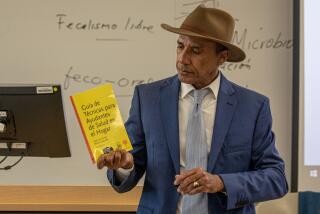Latin of Ancient Classics Lives On : Education: Schools dedicated to preparing students for college still consider the ‘dead language’ an essential part of a learned mind.
- Share via
MEDFORD, Ore. — In a small classroom at St. Mary’s High School, teacher Frank Phillips asked his students to translate the meaning of the words, “Fidelitas, Integritas, Fortitudo,” the motto of the Roman Legions.
“Loyalty, integrity . . . ,” answered student Rachel Miller.
“What is integrity, literally?” interjected Phillips. “If a Martian came down and shot you with a disintegrating ray, what would it mean? It would blow you to pieces. Integrity means wholeness. It meant to the army that it had no holes or flaws in character.”
In this classroom and in classrooms around the country, the dead language of the Roman Empire lives on.
Schools dedicated to preparing students for college still consider Latin an essential part of a learned mind, much as they did 300 years ago. Students feel they do better on standardized tests, particularly vocabulary tests, if they studied Latin. And they are tapping into the Internet and playing computer fantasy games in Latin.
“From 1962 to 1976, we were in a very precipitous decline in Latin enrollment,” said Richard LaFleur, a classics professor at the University of Georgia and editor of the newsletter of the America Classical League, an organization of Latin teachers.
Colleges were dropping language requirements, and if they didn’t need a language to get into or out of college, many students didn’t want to study one. It didn’t help that the Catholic Church had dropped Latin from the Mass, said LaFleur.
“It looked like Latin really was going to become a dead language,” LaFleur said. “Enrollment went from 700,000 to only 150,000 in public schools,” out of 14 million students.
Since the late 1970s, however, the trend has reversed.
“One of the biggest changes in the past decade is the increased number in elementary grades,” LaFleur said. “Also middle-school grades. If you took all that into account, I would guess there were well over half a million.”
That’s still a far cry from enrollment in Spanish, the nation’s most popular foreign language, with 2.6 million students in 1990.
But the increase is enough that Ed Phinney, classics professor at the University of Massachusetts at Amherst, is working hard to recruit Latin teachers. He fears there will be an acute shortage when the current crop retires in the next 10 to 15 years.
“We are putting Latin back into the curriculum because we are beginning to see its usefulness in learning,” said Phinney. “The usefulness is to introduce students to the vocabulary of Western Europe and the United States. The cultural content is also very useful. The culture of the Romans parented American culture.”
The value of Latin has never been forgotten at Boston Latin School, the nation’s first school when it was established in 1635, a year before Harvard College.
“It’s tradition, and we’re steeped in tradition,” said Cornelia Kelley-LaCambria, assistant headmaster at the school, which is public, but has competitive admissions. “Certainly young people complain about it. They complain about everything. But they certainly do not want anyone who comes after them to get away with not having it.”
Though Germanic words tend to make up most of everyday speech in English, words from Latin account for 60% of the words in the dictionary, something St. Mary’s student Tanya Pomeroy notices.
“When I’m reading, I’ll be going, ‘That’s Latin. That’s Latin,’ ” she said.
Latin is moving into computers as well. Transparent Language Inc., a language software company in New Hampshire, will soon offer the “Colloquies” of Aelfric, a Medieval monk, and other works on CD-ROM. It already offers a Windows program that lets a student read a text with a Latin dictionary right on screen.
Gerald R. Culley, associate professor of classics at the University of Delaware, received a government grant to develop a computer game called “Saltus Teutoburgiensis,” which casts the player as a survivor of the Teutoburg Forest, where Germanic warriors wiped out three Roman legions in AD 15.
Students can chat in Latin on computers as well. At St. Mary’s, Phillips’ students were in touch via the K-12 Net to students in Belgium. “It was great,” said Phillips. “They spoke Flemish and French, which of course none of us spoke. It was like the Middle Ages, when Latin was the universal language.”
More to Read
Sign up for Essential California
The most important California stories and recommendations in your inbox every morning.
You may occasionally receive promotional content from the Los Angeles Times.













